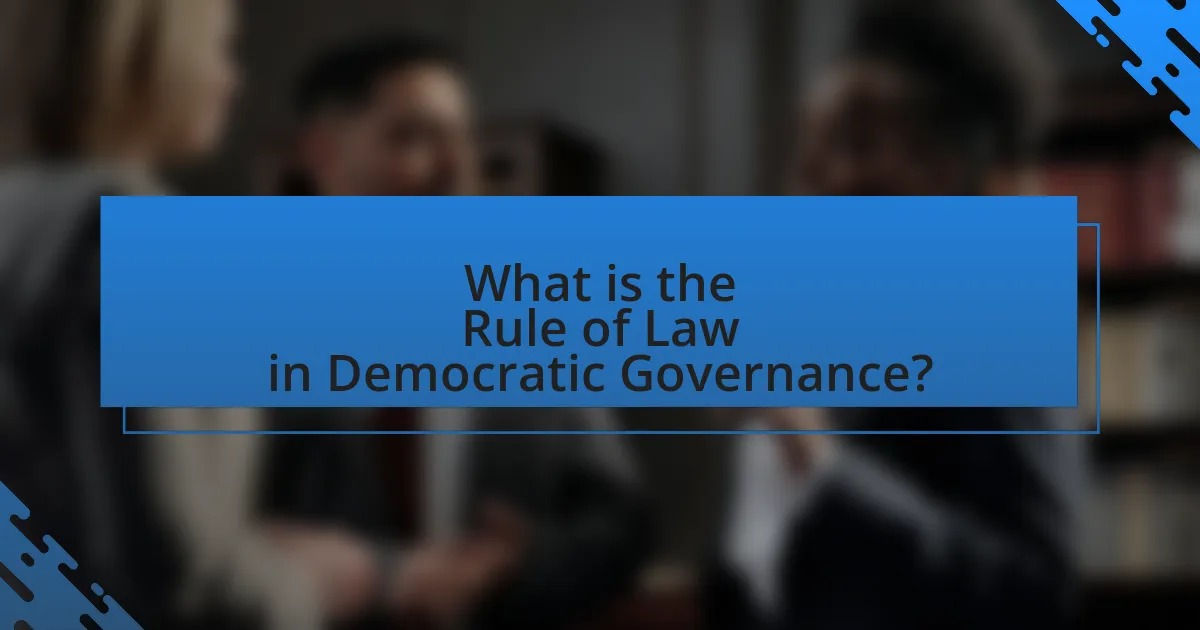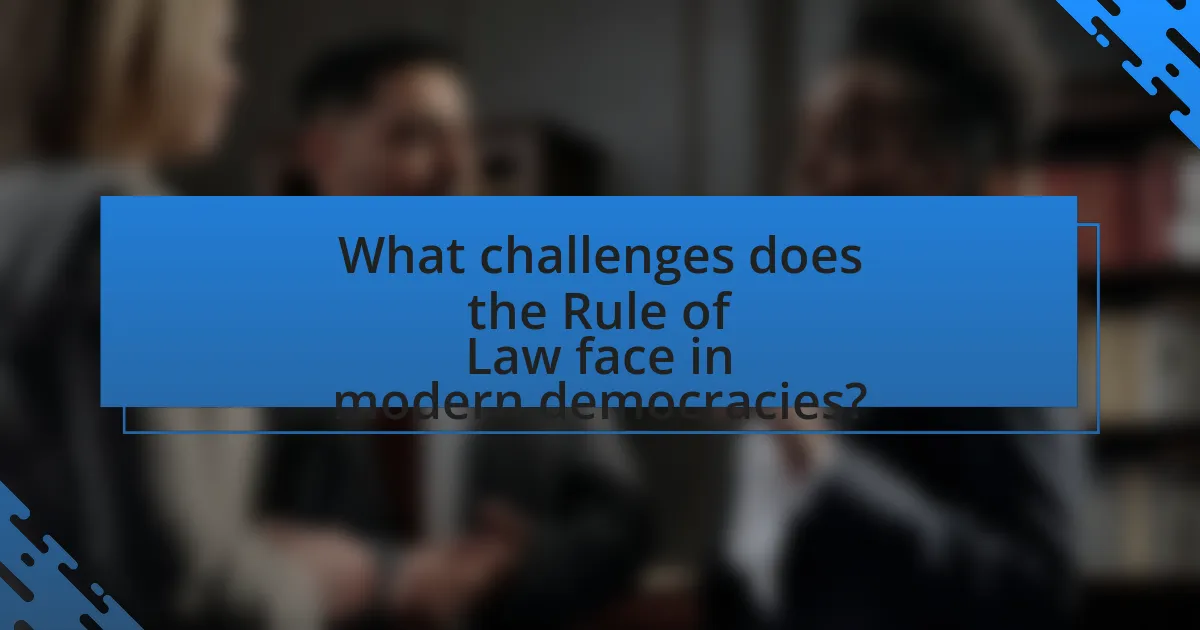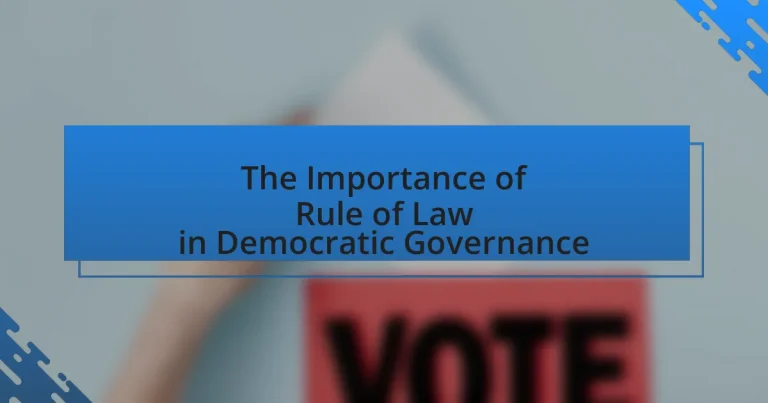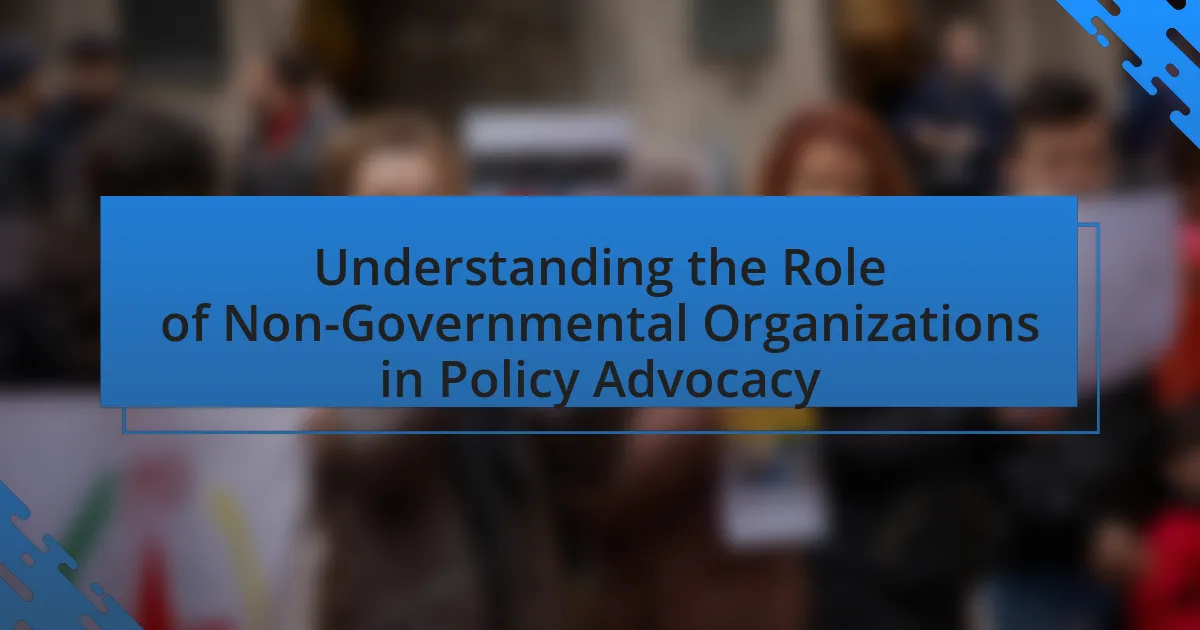The main entity of the article is the Rule of Law in Democratic Governance, which is defined as the principle that all individuals and institutions are accountable to laws that are publicly promulgated, equally enforced, and independently adjudicated. The article explores the significance of the Rule of Law in protecting individual rights, maintaining order, and promoting justice within democratic societies. It outlines key principles such as legal certainty, equality before the law, and accountability, while also discussing the differences between the Rule of Law and other governance principles. Additionally, the article addresses the challenges faced by the Rule of Law in modern democracies, including political interference and corruption, and emphasizes the importance of judicial independence and public participation in reinforcing legal frameworks.

What is the Rule of Law in Democratic Governance?
The Rule of Law in Democratic Governance is the principle that all individuals and institutions are accountable to laws that are publicly promulgated, equally enforced, and independently adjudicated. This principle ensures that laws govern a nation, as opposed to arbitrary decisions by individual government officials. The Rule of Law is foundational to democracy, as it protects individual rights, maintains order, and promotes justice by ensuring that laws apply equally to all citizens, including those in power. Historical examples, such as the establishment of the Magna Carta in 1215, illustrate the long-standing recognition of the necessity for legal accountability in governance.
How is the Rule of Law defined in a democratic context?
The Rule of Law in a democratic context is defined as the principle that all individuals and institutions, including the government, are accountable to laws that are publicly promulgated, equally enforced, and independently adjudicated. This principle ensures that laws govern a nation, as opposed to arbitrary decisions by individual government officials. In democracies, the Rule of Law is fundamental for protecting individual rights, maintaining order, and promoting justice, as it establishes a framework within which citizens can seek redress and hold authorities accountable. Historical examples, such as the establishment of constitutional frameworks in post-World War II democracies, illustrate how the Rule of Law serves as a cornerstone for democratic governance by ensuring that laws apply equally to all citizens, thereby fostering trust in public institutions and enhancing political stability.
What are the key principles that underpin the Rule of Law?
The key principles that underpin the Rule of Law include legal certainty, equality before the law, accountability, and the protection of fundamental rights. Legal certainty ensures that laws are clear, publicized, and stable, allowing individuals to understand their rights and obligations. Equality before the law mandates that all individuals, regardless of status, are subject to the same legal standards, promoting fairness and justice. Accountability requires that government officials and institutions are held responsible for their actions, preventing abuse of power. Lastly, the protection of fundamental rights safeguards individual freedoms and liberties, ensuring that laws do not infringe upon basic human rights. These principles collectively reinforce the framework of a democratic society, as evidenced by numerous legal systems worldwide that prioritize these tenets to maintain order and justice.
How does the Rule of Law differ from other governance principles?
The Rule of Law differs from other governance principles by establishing that laws apply equally to all individuals, ensuring accountability and preventing arbitrary governance. Unlike principles such as the rule of man, where decisions may be based on personal discretion, the Rule of Law mandates that legal frameworks govern actions and decisions. This principle is foundational in democratic societies, as it protects individual rights and promotes justice, as evidenced by the Universal Declaration of Human Rights, which emphasizes the importance of legal equality and due process.
Why is the Rule of Law essential for democracy?
The Rule of Law is essential for democracy because it ensures that laws apply equally to all individuals, thereby protecting individual rights and maintaining order. This principle prevents arbitrary governance and abuse of power, which are detrimental to democratic systems. Historical examples, such as the establishment of constitutional law in post-World War II democracies, illustrate how the Rule of Law fosters accountability and transparency in government, reinforcing citizens’ trust in democratic institutions.
What role does the Rule of Law play in protecting individual rights?
The Rule of Law is essential in protecting individual rights by ensuring that laws are applied equally and fairly to all individuals, preventing arbitrary governance. This principle establishes a legal framework where individuals can seek justice and hold authorities accountable, thereby safeguarding personal freedoms and liberties. For instance, in democratic societies, the Rule of Law supports the enforcement of constitutional rights, such as freedom of speech and due process, which are protected against infringement by the state or other entities. Historical examples, such as the establishment of the Magna Carta in 1215, illustrate how the Rule of Law has historically served to limit the powers of rulers and protect individual rights, reinforcing the idea that no one is above the law.
How does the Rule of Law contribute to political stability?
The Rule of Law contributes to political stability by ensuring that laws are applied consistently and fairly, which fosters trust in governmental institutions. When citizens believe that laws protect their rights and that justice is administered impartially, they are more likely to engage in political processes and support the government. For instance, countries with strong Rule of Law frameworks, such as Sweden and Canada, experience lower levels of corruption and higher levels of public trust, which correlate with greater political stability. This stability is further evidenced by the World Justice Project’s Rule of Law Index, which shows that nations with robust legal systems tend to have more stable political environments and lower incidences of civil unrest.
What are the consequences of a weak Rule of Law?
A weak Rule of Law leads to increased corruption, diminished public trust, and a rise in human rights violations. When legal frameworks are not enforced consistently, individuals and institutions may exploit the system for personal gain, as evidenced by Transparency International’s Corruption Perceptions Index, which shows that countries with weak legal systems often rank lower in transparency and accountability. Furthermore, a lack of legal protection can result in arbitrary governance, where citizens face discrimination and abuse without recourse, undermining democratic principles and stability.
How does a lack of Rule of Law affect public trust in government?
A lack of Rule of Law significantly undermines public trust in government. When laws are not applied consistently or fairly, citizens perceive the government as arbitrary and unaccountable, leading to skepticism about its legitimacy. For instance, according to a 2020 report by the World Justice Project, countries with weak Rule of Law experience lower levels of public trust, as citizens feel their rights are not protected and that government actions are influenced by corruption. This erosion of trust can result in decreased civic engagement and increased social unrest, further destabilizing governance.
What are the implications for social justice and equality?
The implications for social justice and equality are significant, as the rule of law ensures that all individuals are treated fairly and equitably under the law. This principle promotes accountability and transparency in governance, which are essential for addressing systemic inequalities. For instance, countries with strong rule of law frameworks, such as Sweden and Canada, demonstrate lower levels of corruption and greater access to justice, leading to improved social outcomes and reduced disparities among different social groups. Furthermore, the enforcement of laws that protect civil rights and promote equal opportunities fosters an environment where marginalized communities can advocate for their rights, thereby enhancing social cohesion and stability.

How does the Rule of Law function in practice?
The Rule of Law functions in practice by ensuring that laws are applied consistently and fairly to all individuals, thereby maintaining order and protecting individual rights. This principle is operationalized through an independent judiciary that interprets and enforces laws without bias, as evidenced by the establishment of courts that uphold legal standards and provide checks on governmental power. For instance, in democratic societies, legal frameworks are designed to prevent arbitrary governance, as seen in the U.S. Constitution, which outlines the separation of powers and the rights of citizens. This adherence to established laws fosters accountability and transparency, essential components for a functioning democracy.
What mechanisms ensure the enforcement of the Rule of Law?
The mechanisms that ensure the enforcement of the Rule of Law include an independent judiciary, law enforcement agencies, and legislative frameworks. An independent judiciary interprets and applies the law impartially, ensuring that all individuals and entities are held accountable under the same legal standards. Law enforcement agencies, such as police and regulatory bodies, are responsible for upholding laws and maintaining public order, which reinforces compliance with legal norms. Legislative frameworks establish the laws and regulations that govern society, providing a clear structure for legal processes and protections. These mechanisms collectively create a system of checks and balances that upholds the Rule of Law, preventing arbitrary governance and protecting individual rights.
How do independent judiciaries uphold the Rule of Law?
Independent judiciaries uphold the Rule of Law by ensuring that laws are applied consistently and impartially, free from external pressures. This independence allows judges to make decisions based solely on legal principles and evidence, which protects individual rights and maintains public confidence in the legal system. For example, in the landmark case of Marbury v. Madison (1803), the U.S. Supreme Court established the principle of judicial review, reinforcing the judiciary’s role in checking legislative and executive powers. This function is critical in preventing abuses of power and ensuring that all individuals, including government officials, are subject to the law.
What role do law enforcement agencies play in maintaining the Rule of Law?
Law enforcement agencies play a crucial role in maintaining the Rule of Law by enforcing laws, preventing crime, and ensuring public safety. These agencies uphold legal standards by investigating violations, apprehending offenders, and facilitating the judicial process. For instance, the FBI reported that in 2020, law enforcement agencies made over 10 million arrests in the United States, demonstrating their active role in enforcing laws and deterring criminal behavior. Additionally, law enforcement agencies contribute to the Rule of Law by promoting accountability and transparency, which are essential for public trust in the legal system. Their actions help to ensure that laws are applied consistently and fairly, reinforcing the principles of justice and equality under the law.
How can citizens engage with the Rule of Law?
Citizens can engage with the Rule of Law by participating in civic activities such as voting, attending public meetings, and advocating for legal reforms. These actions empower individuals to influence legislation and hold government officials accountable, thereby reinforcing the legal framework that governs society. For instance, in the United States, the Voting Rights Act of 1965 exemplifies how citizen engagement can lead to significant legal changes that enhance democratic governance and protect civil rights.
What are the ways citizens can advocate for the Rule of Law?
Citizens can advocate for the Rule of Law by participating in civic engagement activities, such as voting, attending town hall meetings, and joining advocacy groups. These actions empower individuals to influence legislation and hold government officials accountable. For instance, research by the World Justice Project indicates that public participation in governance enhances the effectiveness of legal systems and promotes adherence to the Rule of Law. Additionally, citizens can educate themselves and others about their rights and legal processes, fostering a culture of respect for the law.
How does civic education promote understanding of the Rule of Law?
Civic education promotes understanding of the Rule of Law by teaching individuals about their rights, responsibilities, and the legal frameworks that govern society. This education fosters awareness of how laws are created, interpreted, and enforced, which is essential for informed citizenship. For instance, studies show that students who receive civic education are more likely to engage in civic activities and understand the importance of legal processes, thereby reinforcing the principles of justice and equality under the law.

What challenges does the Rule of Law face in modern democracies?
The Rule of Law in modern democracies faces significant challenges, including political interference, corruption, and erosion of judicial independence. Political interference occurs when government officials attempt to influence judicial decisions, undermining the impartiality essential for the Rule of Law. Corruption within legal systems can lead to unequal application of laws, where powerful individuals evade justice, as evidenced by Transparency International’s Corruption Perceptions Index, which highlights varying levels of corruption across democracies. Additionally, the erosion of judicial independence, often seen in countries where executive branches exert control over the judiciary, threatens the checks and balances necessary for upholding the Rule of Law, as demonstrated by reports from organizations like the World Justice Project. These challenges collectively weaken the foundations of democratic governance and the protection of individual rights.
What are the threats to the Rule of Law in contemporary governance?
The threats to the Rule of Law in contemporary governance include authoritarianism, corruption, and erosion of judicial independence. Authoritarianism undermines legal frameworks by concentrating power in the hands of a few, as seen in countries where leaders bypass constitutional limits. Corruption distorts legal processes, leading to unequal application of laws, which is evident in nations with high corruption indices, such as Somalia and South Sudan. Erosion of judicial independence occurs when political influence compromises the judiciary, resulting in biased rulings, a phenomenon observed in various democracies where courts are pressured by executive branches. These factors collectively weaken the Rule of Law, threatening democratic governance.
How do corruption and abuse of power undermine the Rule of Law?
Corruption and abuse of power fundamentally undermine the Rule of Law by eroding public trust in legal institutions and creating a culture of impunity. When officials engage in corrupt practices, they prioritize personal gain over the public good, leading to unequal application of laws and favoritism. This behavior diminishes accountability, as those in power may manipulate legal frameworks to protect themselves from scrutiny or punishment. For instance, Transparency International’s Corruption Perceptions Index consistently shows that countries with high levels of corruption experience weaker legal systems and less effective governance. Consequently, the Rule of Law is compromised, as citizens lose faith in the justice system, which is essential for maintaining order and protecting rights in a democratic society.
What impact do populism and authoritarianism have on the Rule of Law?
Populism and authoritarianism significantly undermine the Rule of Law by eroding judicial independence and promoting arbitrary governance. In populist regimes, leaders often prioritize their agenda over legal frameworks, leading to the manipulation of laws to suppress dissent and consolidate power. For instance, in Hungary, Prime Minister Viktor Orbán’s government has enacted reforms that weaken the judiciary, allowing for political influence over court decisions. Similarly, authoritarian regimes frequently employ legal mechanisms to target political opponents, as seen in Turkey under President Recep Tayyip Erdoğan, where laws have been used to detain journalists and activists. These actions create an environment where laws are applied selectively, diminishing accountability and fostering a culture of impunity, ultimately destabilizing democratic governance.
How can the Rule of Law be strengthened in democratic societies?
The Rule of Law can be strengthened in democratic societies by ensuring judicial independence and accountability. Judicial independence allows courts to make decisions free from political pressure, which is essential for upholding laws impartially. For instance, countries with strong judicial systems, such as Canada and Germany, demonstrate that an independent judiciary can effectively protect citizens’ rights and maintain public trust in legal institutions. Additionally, promoting transparency in legal processes and enhancing access to legal resources for all citizens further reinforces the Rule of Law. Research by the World Justice Project indicates that societies with higher levels of legal transparency and access to justice experience greater adherence to the Rule of Law, leading to more stable and equitable governance.
What reforms are necessary to enhance the Rule of Law?
To enhance the Rule of Law, reforms must focus on strengthening judicial independence, ensuring accountability for public officials, and improving access to legal resources. Strengthening judicial independence involves protecting judges from political interference, which is essential for fair and impartial adjudication. Accountability for public officials can be reinforced through transparent mechanisms that investigate and prosecute corruption, as evidenced by countries that have implemented anti-corruption commissions with success. Improving access to legal resources includes providing legal aid and education to marginalized communities, which has been shown to increase public trust in legal institutions and promote equitable justice. These reforms collectively contribute to a more robust Rule of Law, fostering democratic governance and protecting individual rights.
How can international cooperation support the Rule of Law?
International cooperation can support the Rule of Law by facilitating the sharing of best practices, resources, and legal frameworks among nations. This collaboration enhances the capacity of countries to implement and uphold legal standards, as evidenced by initiatives such as the United Nations’ Sustainable Development Goal 16, which emphasizes the promotion of peaceful and inclusive societies, access to justice, and the establishment of effective, accountable institutions. Furthermore, international treaties and agreements, like the Rome Statute of the International Criminal Court, create binding obligations that encourage states to adhere to the Rule of Law, thereby fostering a global environment where justice is prioritized and upheld.
What best practices can be adopted to uphold the Rule of Law?
To uphold the Rule of Law, best practices include ensuring judicial independence, promoting legal transparency, and enforcing accountability for public officials. Judicial independence is critical as it allows courts to make decisions free from external pressures, thereby maintaining fairness and impartiality in legal proceedings. For instance, countries with independent judiciaries, such as Canada, demonstrate lower levels of corruption and higher public trust in legal systems.
Promoting legal transparency involves making laws accessible and understandable to the public, which fosters trust and compliance. The Open Government Partnership, for example, has shown that transparency initiatives can lead to increased civic engagement and better governance outcomes.
Enforcing accountability for public officials ensures that those in power are held responsible for their actions, which deters corruption and abuse of power. The implementation of anti-corruption measures, such as the establishment of independent anti-corruption agencies, has proven effective in various nations, including Singapore, where strict enforcement has significantly reduced corruption levels.
How can transparency and accountability be improved in governance?
Transparency and accountability in governance can be improved through the implementation of open data initiatives and robust oversight mechanisms. Open data initiatives allow citizens to access government information, fostering an environment of trust and enabling public scrutiny. For example, the U.S. government’s Data.gov platform provides access to a vast array of datasets, promoting transparency. Additionally, establishing independent oversight bodies, such as ombudsmen or audit institutions, ensures that government actions are monitored and held accountable. Research by the World Bank indicates that countries with strong accountability mechanisms experience lower levels of corruption and higher public trust in government.
What role does public participation play in reinforcing the Rule of Law?
Public participation is essential in reinforcing the Rule of Law as it enhances accountability, transparency, and legitimacy in governance. When citizens engage in the legal and political processes, they contribute to the creation and enforcement of laws that reflect their values and needs. This active involvement helps ensure that laws are applied fairly and consistently, reducing the likelihood of arbitrary governance. For instance, studies show that countries with higher levels of public participation in decision-making processes tend to have stronger legal frameworks and better adherence to the Rule of Law, as seen in the democratic practices of nations like Sweden and Canada.





